News
Like CDMA to GSM, ISPs May bow to Starlink
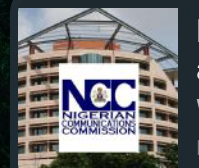
By Sonny Aragba-Akpore
Apart from telecommunications companies (telcos) who provide ubiquitous internet services today,only few conventional internet service providers (ISPs) offer pockets of a semblance of service.
The situation now is akin to the advent of Global System of Mobile Communications (GSM) in 2001 when everyone migrated seamlessly to Digital Mobile Service.
Before GSM ,there were Time Division Multiple Access (TDMA),Code Division Multiple Access (CDMA) among others.But all that has now been confined to the dustbin of history.
No one,not even telecommunications regulators,the Nigerian Communications Commission (NCC) can volunteer reasons for the extinction of these once vibrant operators that provided services despite the threat of comatose Nigerian Telecommunications Limited (NITEL).
Industry players are also strangely silent about the fate of TDMA , CDMA and others.
If we saw the threat of GsM to TDMA and CDMA,are we seeing in clear terms the likely fate that will befall Internet Service Providers (ISPs) following the entry of Elon Musk’s Starlink in the Nigerian telecom environment?
Starlink came with disruptive technologies that are already making a world of difference for consumers and we look on as if nothing is happening.
The company came prepared.
It obtained licences from the NCC and got various permits and approvals to flag off the business of internet services via satellite and equally signed Memorandum of Understanding (MoU) and distribution agreements with Nigerian companies including,Technology Distribution Africa (TD),a big distributor of major technology brands and promoted by a restless technology czar ,Leo Stan Ekeh.
Starlink didn’t stop there ,it has decided to take services to even the unserved and under served communities in Nigeria and parts of Africa for which TD boasts it’s ready for the long haul partnership.
Although,the Internet connectivity provider, Starlink has prohibitive entry level and subscription prices, it’s still going on with what it sees as an agenda for a potential captive market as a result of not very robust services by other ISPs and when it slashed the price of its hardware to N440,000 recently,the company thought it was doing a big Favour to subscribers.
This follows the recently increasing strengthening of the naira against the dollar.
This accounted for 45 per cent reduction from the N800,000 cost of the hardware router earlier.
According to a new price update released by the company, the monthly subscription for the internet service remains unchanged at N38,000.
“N440,000 new hardware price. Unlimited high-speed internet for N38,000 per month,by every standard is high and prohitive “but it is available everywhere in Nigeria,” the internet company said on its website.
As of February 2024, the Starlink router was sold for N378,000. An increment regime implemented in early March saw a price jump to N800,000. This was evidently in response to the rapidly declining value of the naira to as high as N1900 to a dollar.
But by Starlink,s aggressive marketing being deployed ,can indigenous ISPs cope with this complex competition?
So far ,both wireless and cable ISPs are jolted and returning to the drawing board to rejig their strategies for competition with Musk reputed to be one of the richest men in the world.
And with satellite infrastructure dotted around the globe,Starlink is ready to give local ISPs a run for their money?
Will Starlink push local ISPs into extinction and out of relevance like GSM did to CDMA?
Space Exploration Technology Corporation (Space X ) owners of Starlink got six licenses in a roll from the NCC and is expected to deploy nearly $30b over time for the Nigerian operations alone.
The government is excited that with the entry of Starlink,it may achieve 70% broadband connectivity by 2025 as enshrined in the National Broadband Plan (NBP) 2020–2025.
But is the government just desperate to achieve this at the expense of low purchasing powers of subscribers?Time will tell.
Starlink,s six licenses include that for ISP, Gateway Service Provider,international Data Access (IDA),Sales and Installation Major,Gateway Earth Station and Very Small Aperture Terminal (VSAT) thus making it a mega player and a big threat to other players in the industry.
Starlink officially announced its presence in Nigeria in January 2023. The company, which initially quoted its prices in dollars at $600 for the hardware and $43 for the subscription, changed to naira upon its official announcement.
According to Internet Service Providers (ISPs) data released by the Nigerian Communications Commission (NCC), Starlink is now one of the leading ISPs in Nigeria in terms of customer numbers. As of Q3 2023, Starlink Nigeria’s customer base stood at 11,207.
While cable cuts remain a nightmare,Starlink’s boasts of bridging the gap, with its potential impact extending far beyond addressing temporary outages. These include reaching Underserved Areas where Traditional ISPs often struggle to reach remote regions due to the high cost of infrastructure deployment.
Starlink’s satellite-based approach can effectively bridge this gap, offering high-speed internet access to previously underserved communities by unlocking educational and economic opportunities for millions of Nigerians currently excluded from the digital world.
Starlink boosts Business Continuity by avoiding Frequent internet disruptions that can be detrimental to businesses, especially those reliant on online operations.
Starlink claims to be reliable with independent internet access that can provide much-needed resilience, ensuring business continuity even during cable outages.
The recent cable cuts hampered online learning and remote work arrangements. Starlink’s stable internet connection may have facilitated smoother online learning experiences for students and enable seamless remote work for professionals across the country.
But that is where the beauty ends.
TD Africa, the major distributor for Starlink said , it planned to leverage Starlink’s unique selling points such as high speed, low latency, broad coverage and scalability to bridge the digital divide.
In 2023, Starlink’s global customer base rose to 2.3 million with a presence in over 70 countries
According to the agreement, TD Africa’s extensive distribution network and experience coupled with Starlink’s high-speed Internet aimed to deliver innovative solutions and services that offer broadband connectivity, promoting economic development across Africa.
TD Africa, founded some 24 years ago, will distribute Starlink Internet Kits across Nigeria. It has over 27 global companies including Microsoft, IBM, Apple, Cisco, Hewlett Packard, Dell Technologies, Samsung, Huawei, Nokia, Lenovo, Asus, and many more on its distribution network.
TD Africa’s Coordinating Managing Director, Mrs. Chioma Chimere, highlighted the synergy between TD Africa’s experience as a leading distributor of technology and business solutions and Starlink’s commitment to transforming how the world accesses the internet.
She expressed excitement about the growth opportunities this agreement presents across the continent while emphasising TD Africa’s mission to provide accessible, affordable, and usable Internet solutions to individuals and businesses.
TD Africa boasts that” this transformative agreement signals a new era for Internet access in Africa, with Starlink and TD Africa leading the charge in providing innovative and reliable solutions to meet the evolving needs of the digital economy.”
As at March 2024,internet subscribers base stood at 164,368,292 .Of this figure,GSM accounts for 163,895,185.
ISPs accounted for 213,876 while Voice Over Internet Protocol (VoIP) accounted for 238,139 and fixed/ cable connections stood at 21,092.
By March 2024 too,the number of ISPs stood at 255 and these include the followings:
Spectranet Ltd,Astramix Ltd,VDT Comms Ltd,Cobranet Ltd,Ngcom Ltd,MainOne, an Equinix Company,Hyperia Ltd,I-World Networks Ltd.
There are Inq. Digital Nigeria Ltd (formerly Vodacom),Galaxy Backbone Limited,
Dotmac Technologies Ltd,Radical Tech Network Ltd,Cyberspace Network Ltd,
Suburban Broadband Ltd ,IPNX,Tizeti Network Ltd among others.
Currently, Starlink does not offer truly unlimited data plans in Nigeria though there are reports of data prioritization being implemented in some regions during peak usage times. However, data caps are reportedly quite generous, exceeding the average data consumption of most Nigerian internet users.
Nonetheless,Fiber optic internet offers the fastest and most reliable internet connection currently available. Speeds can reach up to 1 Gigabytes per second (Gbps) and are less susceptible to latency issues compared to satellite internet. In all ,fiber optic infrastructure is expensive to deploy and maintain, limiting its availability in remote areas but more reliable.Starlink offers a faster and more consistent option than traditional satellite internet but may not match the raw speed of fiber.
Starlink offers a significant advantage over mobile data technologies like Long Term Evolution (LTE).
While LTE offers average download speeds between 30-100 Mbps, Starlink’s current minimum download speed of 25 Mbps already surpasses baseline LTE speeds. With potential future upgrades, Starlink could significantly outpace even the fastest LTE connections available in Nigeria.
Nigeria is currently one of Africa’s largest consumer markets, and the way people shop has evolved significantly. The internet has influenced a shift in consumer spending behaviour. As more people gain internet access, they explore online options like subscriptions, selling used items, or venturing into rental services. It’s a situation of where convenience and adaptability reign supreme. For example, when Nigerians experienced a cash crunch earlier in the year, they quickly adapted to cashless systems. However, changing landscape has resulted in substantial e-commerce spending in Nigeria, according to the international trade administration, the market generates approximately $13 billion yearly and is expected to hit $75 billion in revenue yearly by 2025.
So far this growth has been fueled by the increasing internet penetration. Now with even more people having internet presence connectivity, businesses have access to a vast pool of potential customers, creating economic growth, and attracting investments to the e-commerce sector.
The surge in internet users in Nigeria also means an abundance of valuable data for businesses to leverage. With a larger customer base and increased online activity, companies have access to a wealth of information about consumer behaviour, preferences, and purchase history. By understanding their customers better, companies can personalize their offers and make sure they’re giving people what they want.
We saw this happen during the pandemic when many stores had to change how they did business and offer new services.”
News
OERAF Holds Memorial Lecture on the Benefits of Debate Competitions for Students in Ughelli
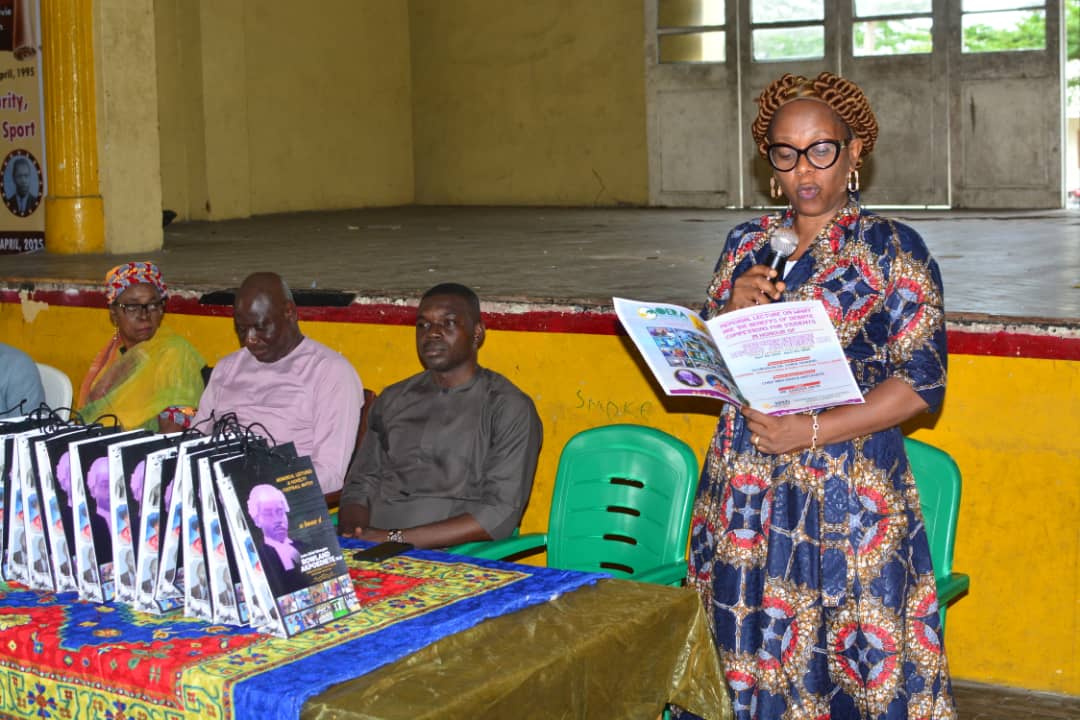

The Executive Director of Olotu and Ekuogbe Rowland Akpodiete Foundation (OERAF), Dr. Olotu Otemu Akpodiete, held a memorial lecture on the benefits of debate competitions for students in Ughelli, Ughelli North Local Government Area of Delta State.
The event took place, April 10, 2025, in honor of the remembrance of the passing of his grandfather, the late Chief Ekuogbe Rowland Akpodiete, Ph.D.
In his opening remarks, Dr. Olotu Akpodiete encouraged the students to take their academic activities very seriously, assuring them that his foundation would continue to provide support for quality education in Nigeria.
Olorogun Dr. Chris Oharisi, Chairman of the Board of Governing Council at Delta State College of Health Science and Technology, Ofuoma-Ughelli, who chaired the occasion, advised the students to be optimistic.
He emphasized the importance of debate to students, stressing that it helps them excel in public speaking.
On his part, Mr. Samson Obor, Principal of Government College Ughelli, thanked the organizers (OERAF) for their good work and encouraged the students to take their studies seriously.
He added that the importance of debate can never be overemphasized.
Presenting the lecture, Olorogun (Mrs.) Grace Akpodiete highlighted several benefits of debate for students.
She mentioned four major benefits: academic benefits, personal benefits, career benefits, and life skills benefits.
She concluded that by participating in debate competitions, students can develop a wide range of skills that benefit them academically, personally, and professionally.
During her speech about the life of the late Chief Ekuogbe Rowland Akpodiete, Barrister (Mrs.) Agboka Akpodiete-Omale highlighted his integrity and commitment to philanthropy.
She praised him as a great disciplinarian, dedicated community leader, lawyer, and known for his generosity.
Chief Dr. Linda Ikpuri, in her closing remarks, expressed satisfaction with the great job that Olotu and Ekuogbe Rowland Akpodiete Foundation is doing, assuring that she would collaborate with OERAF to build a better society.
Other highlights of the event included the presentation of cash prizes to various schools in attendance.
The schools included Lulu Schools, Government College Ughelli, Otovwodo Grammar School, Oharisi Secondary School, Transcorp Secondary School, Ekakpamre, Girls Model Secondary School, Evwreni, Divine Fire School, and Ekiugbo Grammar School.
News
Constituents Drag Akpabio, Senate to Court Over Suspension of Natasha
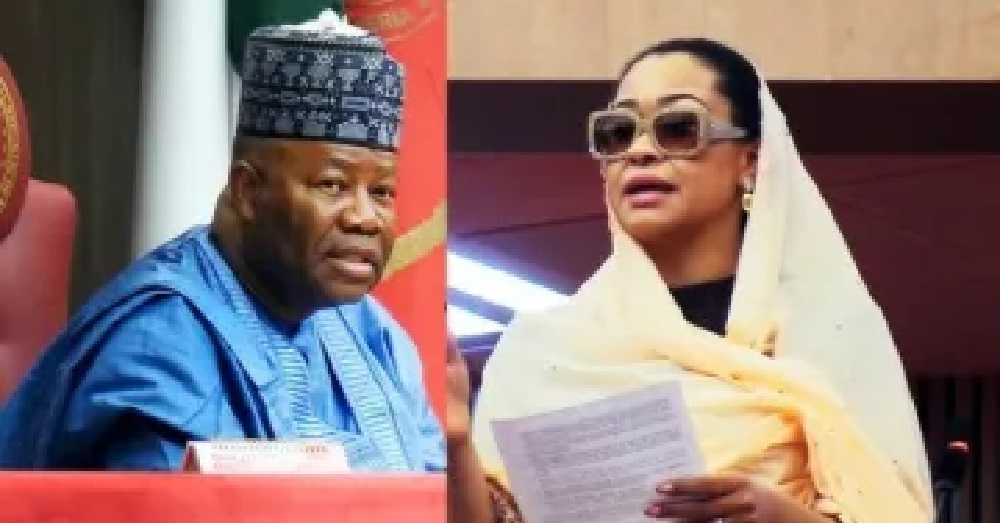
A group of constituents from Kogi Central Senatorial District have dragged the President of the Senate, Godswill Akpabio, and the Nigerian Senate before the Federal High Court in Abuja over the suspension of their senator, Natasha Akpoti-Uduaghan.
The legal action, filed under suit number FHC/ABJ/CS/654/2025, is challenging the six-month suspension of Akpoti-Uduaghan, which the Senate imposed following a rejected sexual harassment petition she filed against Akpabio. The suit, led by prominent human rights lawyer Femi Falana (SAN), argues that the suspension violates the constituents’ constitutional right to representation.
Neda Imaseun, chairman of the Senate Committee on Public Conduct, Ethics, Privileges, and Public Petitions, had announced the suspension in March, citing what he called a “total violation of Senate rules” by Senator Akpoti-Uduaghan.
However, the plaintiffs argue that the Senate’s decision lacks lawful justification and contravenes democratic principles. They are invoking Article 13(1) of the African Charter on Human and Peoples’ Rights, which guarantees citizens the right to freely participate in government through elected representatives.
“The suspension has effectively silenced the voice of Kogi Central in national debates and legislative processes,” the suit states, accusing the Senate of overreaching its powers.
The applicants — Ovavu Iliyasu, Isah Otini, Onivehu Amoto, Isah Mediant, Ogunmola Samuel, Umar Oyiza, Megida Sadiq, Siyaka Akinlade, Michael Ademola, and Ananyi Omeiza — are seeking a court declaration that the Senate acted beyond its constitutional powers.
They are asking the court to nullify the suspension and restore all of Akpoti-Uduaghan’s rights and privileges, including access to her office, full participation in Senate proceedings, and payment of her entitlements. Additionally, they are seeking an injunction to prevent the Senate from taking any further actions that could infringe on their fundamental rights.
As of press time, no date has been fixed for the hearing.
News
Nigeria-China Reaffirms Commitment To Strategic Partnership
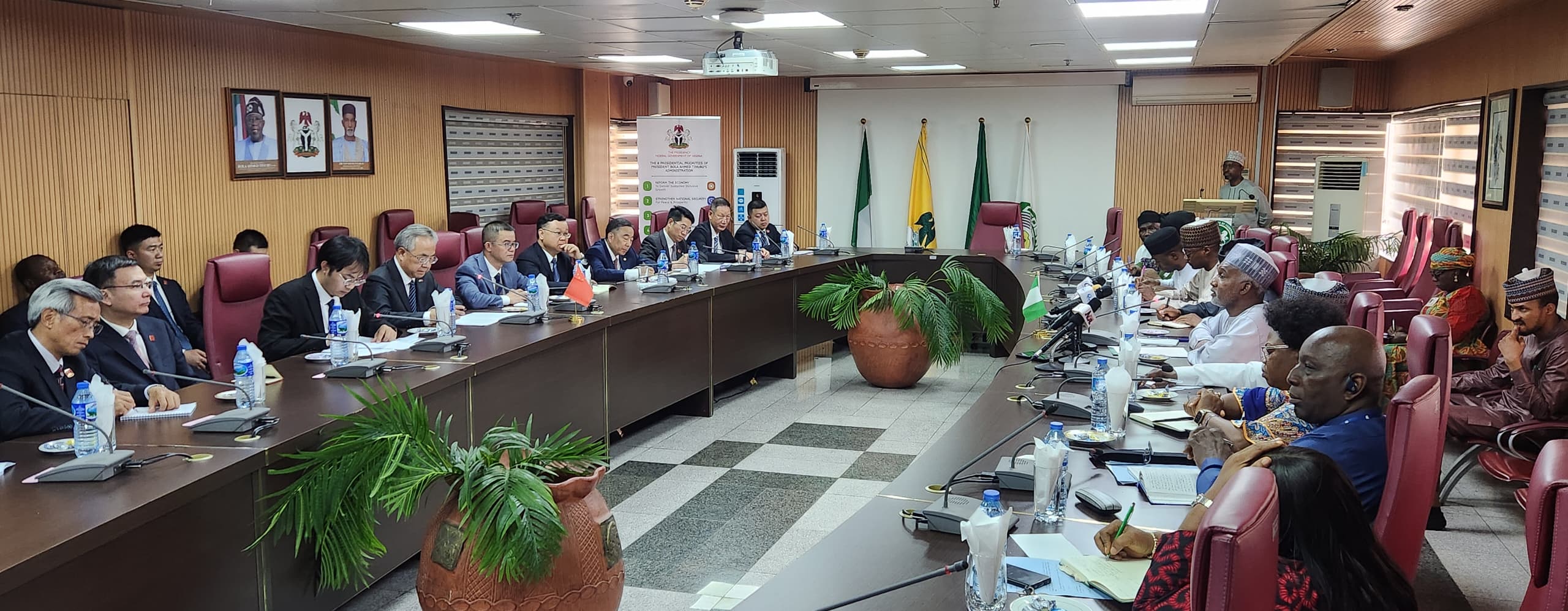
By Gloria Ikibah
Nigeria and China have reaffirmed their commitment to deepening bilateral ties and advancing their comprehensive strategic partnership.
The Vice Chairman of the Chinese People’s Political Consultative Conference (CPPCC), His Excellency Hu Chunhua, restated this when he led a high-level Chinese delegation on a visit to the Nigeria’s Minister of Foreign Affairs, Ambassador Yusuf Maitama Tuggar in Abuja, Nigeria on Friday.
Hu who conveyed warm greetings from Chinese President Xi Jinping and Vice President Han Zheng to Nigeria’s Vice President Kashim Shettima, praised the strong diplomatic relations between the two nations and reiterated China’s commitment to working closely with Nigeria in implementing the outcomes of the Forum on China-Africa Cooperation (FOCAC) and furthering the achievements of the Beijing Summit.
“China is willing to work together with Nigeria to implement the important consensus reached by our leaders and promote new and greater achievements in the China-Nigeria comprehensive strategic partnership,” Hu stated.
He also acknowledged the efforts of Nigerian Foreign Minister Yusuf Maitama Tuggar in strengthening China-Nigeria relations through past engagements, including bilateral committee meetings and high-level visits.
Responding, Minister Tuggar warmly welcomed the Chinese delegation on behalf of the Federal Government and Vice President Shettima, who was unavoidably absent.
Tuggar congratulated Hu on his assumption of duties as Vice Chairman of the CPPCC, acknowledging the important role the body plays in China’s political system.
He also expressed Nigeria’s appreciation for China’s ongoing partnership, especially in the areas of infrastructure development, trade, and investment.
“We thank you for the continuing partnership in actualizing our ambition of infrastructure development, increased trade and investment, and building a 21st century nation in Nigeria. Relationships and partnerships such as the one that exists between Nigeria and China are ones that we should continue to hold dear to our hearts and ensure they continue not just to exist but to excel”, he stated.
The Minister also praised China for successfully hosting the recent FOCAC summit and emphasised the importance of the relationship, describing it as one to be cherished and nurtured.
“Relationships and partnerships such as the one that exists between Nigeria and China are ones that we should continue to hold dear to our hearts and ensure they continue not just to exist but to excel.
“We want to continue to assure you of our commitment to the one China principle, and at the same time we want to thank you and commend you for recognizing Nigeria’s leadership in West Africa within the fold of the economic community of West African states and on the African continent as a whole.
“Although it is evident that we are not as large demographically as China, we are the largest country on the continent, and like China, we pay close attention and importance to consultation, consulting people and deliberation in the exigencies of governance and leadership.
“So we recognize the work that you are doing and reassure that this is something that we also do in our country to ensure that a largely demographic nation such as Nigeria and a diverse one”, he added.
As Africa’s most populous nation and a key regional leader, Nigeria reaffirmed its dedication to dialogue and inclusive governance, values it shares with China. Both countries pledged to continue working closely to ensure mutual benefits from their strategic cooperation.
The visit is expected to further strengthen diplomatic, economic, and cultural ties between Nigeria and China, building on decades of strong bilateral relations.
-

 News13 hours ago
News13 hours agoAmbassadorial list ready for NASS review after DSS clearance – FG
-

 News24 hours ago
News24 hours agoAkpabio wants Senator Natasha jailed over inflammatory comments
-

 News21 hours ago
News21 hours agoMichelle Obama Speaks On Alleged Failed Marriage with Her Husband Barack Obama
-
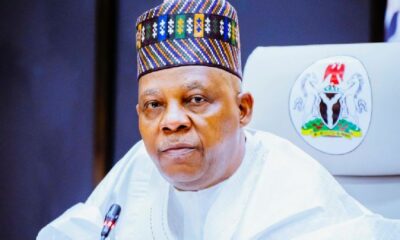
 News9 hours ago
News9 hours agoSecurity operatives halt attempt to break into VP Shettima’s residence, nab suspect
-

 News6 hours ago
News6 hours agoIbas pouring petrol on fire in Rivers, Briggs laments
-

 News24 hours ago
News24 hours agoSenior lawyer caution against misinterpretation of Supreme Court Judgement
-

 News8 hours ago
News8 hours agoSuit Seeking To Sack Ibas As Administrator Suffers Heavy Setback
-

 News14 hours ago
News14 hours agoPopular actress passes away + Photo






